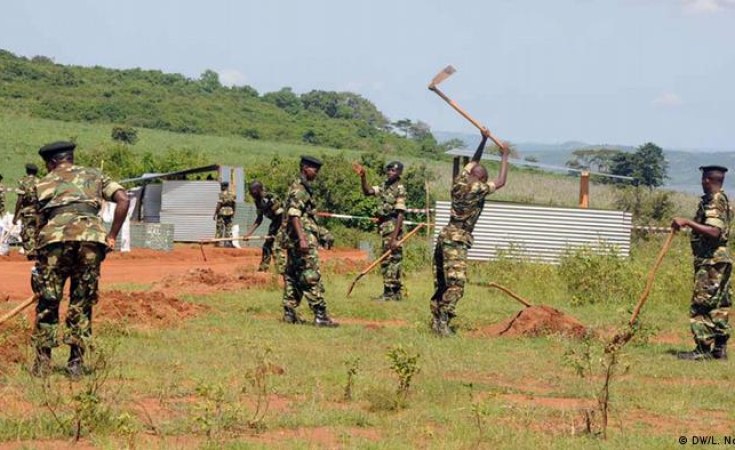All offensive language, hate speech, threats of genocide and other politically inciting language proliferated in the DR Congo must cease and must be discouraged by all parties, regional leaders emphasized on Monday, June 20.
This was at the end of the third EAC Heads of State Conclave on DR Congo which was hosted by President Uhuru Kenyatta, the current EAC chairperson, in Nairobi.
The leaders deliberated on the security situation in eastern DR Congo and on measures to promote peace, stability and development in the east of the country and the greater east African region.
A Communiqué states that they emphasized that the Congolese people must be encouraged to work together in order to stabilize the east of their country for it to prosper.
"The Heads of State directed that an immediate ceasefire should be enforced and cessation of hostilities should commence immediately, including withdrawal from recently taken positions," reads part of the statement.
"In doing so, the political process should be intensified by all parties in order to allow the citizens of the DRC feel safe and secure and be able to pick up and continue their respective social, cultural and economic activities."
In Nairobi, Kenyatta was joined by Presidents Paul Kagame of Rwanda, DR Congo's Félix Tshisekedi, Yoweri Museveni of Uganda, Evariste Ndayishimiye of Burundi and Salva Kiir of South Sudan.
Tanzania's Samia Suluhu was represented by her country's High Commissioner to Kenya, John Stephen Simbachawene.
The conclave agreed and reinforced that trust and confidence-building, cessation of hostilities, unconditional ceasefire, participation in the political processes in the country, prioritization and participation in the country's development, citizenship, presence of foreign negative elements, fate of combatants during reintegration and status of refugees and internally displaced persons "are among critical issues that require concerted, urgent and durable resolution."
Monday's high-profile regional summit was the third in a space of just over two months.
The first and second conclaves were held on April 8 and 21, respectively.
Regional force receives operational mandate
During the second conclave, the leaders agreed to the deployment of a regional force to deal with armed groups in the Congo.
According to Monday's communiqué, the Conclave commenced with a detailed brief on the military track, presented by the Chief of Defence Forces of Kenya, Gen. Robert Kibochi, head of the Committee of EAC Chiefs of Defence Forces.
The Chiefs of Defence Forces met, earlier on Sunday, June 19, in Nairobi, to consult on the proposed deployment of a regional force in eastern DR Congo. The Chiefs of Defence Forces of all the seven EAC countries attended the meeting, it is noted.
"The brief defined the problem, highlighted the threat analysis, concept of operations (CONOPs), status of forces agreement (SOFA), rules of engagement (ROE) and other legal and technical regulations to facilitate the operationalization of the Regional Force and its various operational arms," reads the communiqué.
As noted, the leaders accepted and adopted the concept of operations, status of forces agreement, and rules of engagement as presented by the Chiefs of Defence Forces for immediate implementation.
"In doing so, the Heads of State instructed that the Regional Force should in cooperation with the military and administrative forces of the DRC seek to stabilize and secure the peace an in the DRC."
The regional force should also cooperate in implementation of the disarmament and demobilization process.
The regional force will be constituted as an EAC force under the EAC Protocol on Peace and Security and the EAC Treaty Article 124 on regional peace and security and Article 125 on cooperation in defence.
"The regional force received its operational mandate and detailed its operational structure for the Heads of State."
No date is given of when the regional force will be deployed.
Mid-way through the inter-Congolese dialogue in April, there were signs of optimism after at least 30 Congolese armed groups met for talks in Nairobi.
However, things soon took a nosedive when disagreements emerged between Kinshasa and one of the groups, the M23 rebels, which have since been designated by Tshisekedi's government as terrorists and sidelined from the Nairobi talks.
DR Congo has accused Rwanda of backing the rebels.
Kigali has rejected the accusations, with the UN force in the Congo (MONUSCO) also saying they had no evidence of Rwanda's involvement.
Meanwhile, tensions have flared up between the two neighbours, with Kigali blaming Kinshasa of escalating cross-border provocations.
The latest such incident happened on June 17 when an armed Congolese soldier crossed the common border in Rubavu and opened fire at Rwandan security and migration personnel. The Congolese soldier was shot dead 25 metres inside the Rwandan territory.
The latest Nairobi meeting took place amid growing concerns over proliferation of hate speech and incitement to violence against both Rwandophone Congolese and Rwandan nationals.
Videos of marauding mobs armed with machetes, searching for "enemies" are shown on social media. Some videos show civilians being attacked and hacked or burnt to death in broad-day light, with the deteriorating situation prompting MONUSCO to publicly express concerns.


